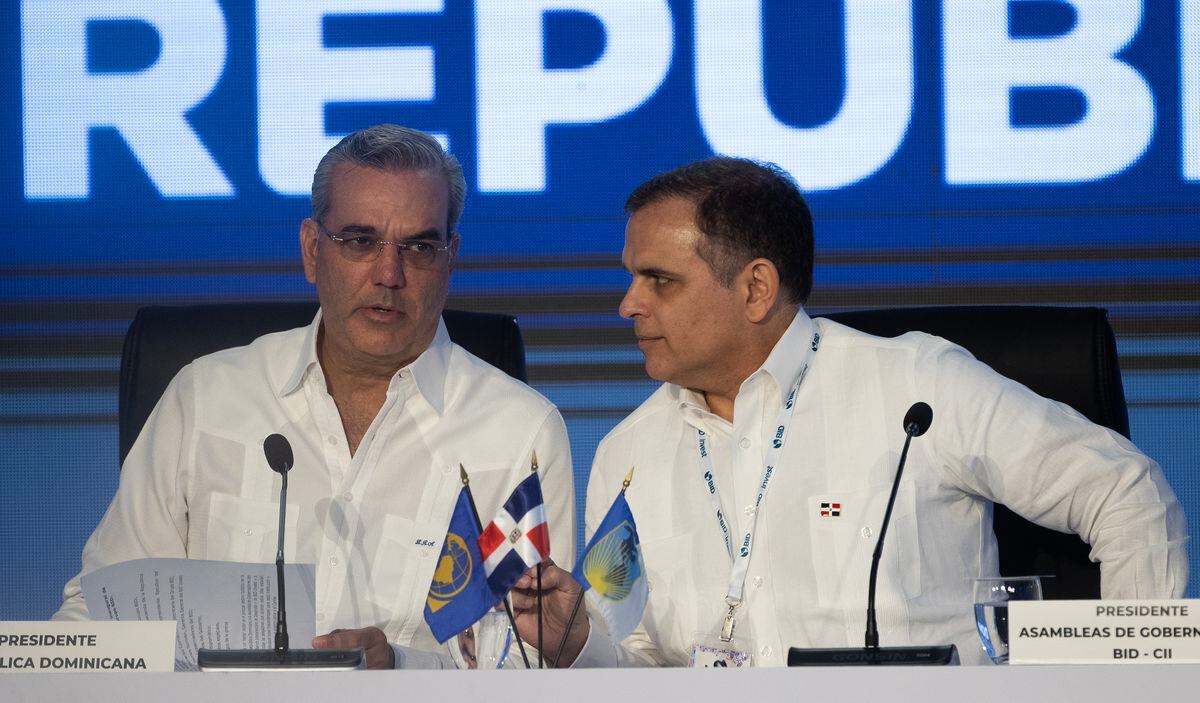The Government of Colombia was the first to take sides and it still does not give its arm to twist. Despite the resistance of other countries in the region, President Iván Duque shows no cracks in his support for Mauricio Claver-Carone, the United States candidate for the presidency of the Inter-American Development Bank (IDB) who has divided diplomacies Latin American. In the game, Bogotá plays its role as a privileged partner of the Donald Trump Administration, despite the risk of being upset by an eventual - and not so distant, in light of the polls - defeat of the Republican in the elections of November involving a change of tenant in the White House.
Last week, while a score of former presidents - American, European and Asian - joined the growing calls to postpone the IDB election, scheduled for September 12, the Colombian president reaffirmed his support during the visit of a delegation from North American officials that included Claver-Carone himself, one of the Republican's strong men for Latin America and the first American nominated to lead the IDB, breaking the tacit agreement so that that position is reserved for a Latin American. Since 1959, the organization has only had four presidents: the Chilean Felipe Herrera (1960-1970), the Mexican Antonio Ortiz Mena (1970-1988), the Uruguayan Enrique Iglesias (1988-2005) and the Colombian Luis Alberto Moreno (who ends now his mandate after 15 years at the helm of the multilateral).
Duque has justified his support in reciprocity: Washington has historically supported Colombia in international organizations, including the aspiration of Moreno in his day. "There is also a clear agenda that you have presented, and it is to be able to stimulate in the coming years a recovery of the Latin American economies that have been affected by this pandemic," he said during a joint statement with the National Security Advisor. Robert O'Brien, and the head of the Southern Command, Admiral Craig Faller, when staging the close relationship between Bogotá and Washington.
Faced with the strategy of the European Union, Argentina, Chile, Mexico or Costa Rica to postpone the IDB vote until March, Colombia remains on the shore that it set for more than a month, when it welcomed Claver's nomination "with approval" -Carone. Bogotá also rejected a week ago, along with 16 other countries, the possibility of postponing the election. "Our peoples need solutions that cannot be postponed," wielded the statement issued by the Colombian Foreign Ministry, and also signed by the Bahamas, Bolivia, Brazil, Ecuador, El Salvador, Guatemala, Guyana, Haiti, Honduras, Jamaica, Panama, Paraguay, The Dominican Republic, Suriname and Venezuela –represented by a delegate from Juan Guaidó–, as well as the US Peru and Uruguay did not sign, two countries traditionally aligned with the White House and whose votes seem key in the postponement strategy.
With Claver-Carone, Argentine Gustavo Béliz and former Costa Rican president Laura Chinchilla compete, but the expectation is focused on postponing the decision until after the US has elected president on November 4.
The diplomatic pulse remains open. To carry out the election in the IDB, at least 75% of the voting power must participate; The US has 30% and the countries that rule out postponement, another 23.9%. Argentina, Mexico, Chile, Costa Rica and the EU add up to just over 31%, so loads are still being rearranged. Other members with significant percentages are Canada (4%) and Japan (5%). The vote is secret and the block that seeks to postpone the election needs that at least 25% of the shareholders do not appear in the election.
"I have the impression that Duque is no longer as alone as at the beginning, when he was the first Latin American president to express favoritism for the candidate that the United States was proposing," says internationalist Sandra Borda. The Colombian president seeks "to manifest particular forms of loyalty to US initiatives in order to obtain aid in return and a significant waiting time to achieve more results in the fight against drugs," adds the author of Why are we so parochiales ?, a brief history of Colombian diplomacy. "This is a government very convinced that showing loyalty to the United States, and that the United States appreciates that loyalty, is already a gain in diplomatic matters."
Duque's position has met with numerous detractors in his country. His predecessor, Juan Manuel Santos (2010-2018), together with the Brazilian Fernando Henrique Cardoso, the Chilean Ricardo Lagos, the Uruguayan Julio María Sanguinetti and the Mexican Ernesto Zedillo, signed a statement expressing their “deep concern” at a nomination they consider a "New aggression" to the multilateral system. With less than three months before the elections in the United States, "the prudent thing is to postpone the decision on who will lead the IDB" until it is certain that it has the support of the Treasury Department and the US Congress to capitalize the institution, he wrote the former Minister of Finance Mauricio Cárdenas. "Otherwise, the entity could be ostracized, at a critical time for Latin America," he argued.
“I find the position of my Government, the Colombian Government, on this matter unacceptable. Colombia is one of the beneficiaries of the unwritten rule. They are wrong, it is a historical error: they do not have to break the tradition of a Latin American presiding over the IDB, ”says José Antonio Ocampo, one of the most prestigious economists in the region, reports Ignacio Fariza . “I undoubtedly support the position of the European Union and of Mexico, Chile and Peru. And I hope that this does not turn into a political confrontation: the worst possible scenario is that for political reasons the United States imposes a candidate who does not have the backing of the next Administration. The only positive scenario is to postpone the election until next year's meeting in Barranquilla, ”said the former Minister of Finance.
A high risk play
The commitment to Claver-Carone, of Cuban origin, is part of the diplomacy that has characterized Duque during his two years in power. As his political mentor, former President Álvaro Uribe, had already done, today in house arrest by order of the Supreme Court of Justice, the president has set the axis of his foreign policy in Washington. The two countries have been close allies in the fight against drug trafficking and guerrillas since the late 1990s, and Venezuela has emerged as another key issue on the binational agenda. In tune with Trump, Duque has been the main standard-bearer of the “diplomatic siege” against Nicolás Maduro, and although he has faced tension due to the record levels of illicit crops, he has managed to stop its growth. “Duque has a very Trump-like vision of Latin America. He believes that the problem is Venezuela, Cuba and Nicaragua ”, points out the political scientist and ex-diplomat Alfonso Cuéllar.
Claver-Carone is also very close to the Colombian ambassador in Washington, Francisco Santos, Uribe's former vice president whom everyone in Colombia knows simply as Pacho . The diplomat overcame a controversy over the disclosure last November of a private conversation with Foreign Minister Claudia Blum in which he criticized, among others, the State Department. After having come to offer his resignation, Pacho Santos' position has been strengthened, and everything indicates that he is the architect of support for Trump's divisive candidate to preside over the IDB.
Siding with the Republican, at a time when all the polls favor Joe Biden, his Democratic rival, is a very high risk move. “While everyone, including Latin Americans, is in a moment of pause and caution, waiting to see what happens, we for some desperate reason feel that we have to make the bet now, and that we have to do it for the Government ”, Points out Sandra Borda. One of the great purposes of Colombian foreign policy has always been to try to build and maintain a bipartisan consensus, especially in Congress, he recalls warning of the danger of an alliance so close that it threatens to break that consensus.






/cloudfront-eu-central-1.images.arcpublishing.com/prisa/F5MUQT6JFZFAZGDYBYG5BZQJIQ.jpg)

/cloudfront-eu-central-1.images.arcpublishing.com/prisa/4PKPLHZOXBG5TEAQ6JNDTUJXBA.jpg)
/cloudfront-eu-central-1.images.arcpublishing.com/prisa/RBDI3FWLIZDXBFZRE73ADUDT4M.jpg)





